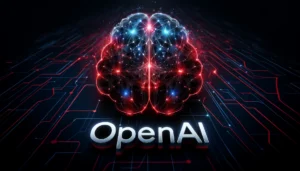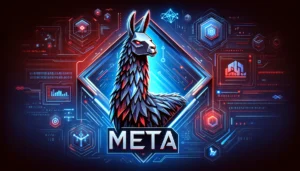AI is captivating the imaginations of the world’s biggest investors – but will the hype train keep rolling?
A couple of decades ago, AI was but a twinkle in the eye of academics and researchers. While the technology’s history dates back over half a century, 2023 was the year that AI ‘went mainstream.’
We’re now witnessing a Cambrian explosion of AI tools that can do practically everything, from creating music and art to generating text, code, videos, and animations. You name it, and AI does it, or can help at the very least.
The buzz is infectious – AI is predicted to interweave into virtually all technologies. The noise has awoken venture capitalists from their post-pandemic slumber.
After all, why wouldn’t you rush to invest in something that promises to integrate itself into every facet of our lives?
The future is back, and the world’s biggest investors are scrambling to take advantage. With that, we’ve seen some massive funding rounds for companies that barely even offer functional products.
A high speculatory market? Absolutely. Can it sustain itself long-term? That depends on AI risks and regulations, which are looming on the horizon.
Recent AI tech funding rounds indicate investment appetites
While Microsoft’s $10bn investment in OpenAI is the biggest bet of the year so far, funding rounds over the last month – even the last 7 days – indicate AI’s seismic impact on venture capital.
In January, Forbes cited that venture capitalists increased investment in generative AI by 425% since 2020 to $2.1bn.
TechCrunch reported that angel and seed deals also grew, with 107 deals and $358.3m invested in 2022 compared to 41 and $102.8m in 2018.
Let’s take a brief look at a few notable funding rounds for AI companies that predominantly took place this June.
Inflection AI ($1.3B – July)
Co-founded by ex-DeepMind CEO Mustafa Suleyman, Inflection AI has raised over $1.5n. The company primarily develops large language models (LLMs) that assist users with personal advice, unlike fact-driven models like ChatGPT.
Inflection AI’s product is an AI assistant called Pi (short for Personal AI). This AI assistant aims to deliver personalized information and advice to users, making it a potentially versatile tool for both public and enterprise use. However, Pi remains largely untested in the public domain. You can access a demo on the Inflection website.
The company’s latest round of funding, which included investments from notable figures such as Reid Hoffman, Bill Gates, and Eric Schmidt, as well as tech giants Microsoft and Nvidia, is intended to support Inflection’s plans to create the world’s largest AI hardware cluster.
Suleyman said, “We’ll be building a cluster of around 22,000 H100s. This is approximately three times more compute than what was used to train all of GPT-4. Speed and scale are what’s going to really enable us to build a differentiated product.”
Why are they building it? Surely it’s not just for Pi? We can only speculate, which is precisely what’s fueling growth in AI investment.
Anthropic ($450M – June)
Founded in 2021, Anthropic is an AI startup with notable Google backing despite being founded by ex-OpenAI researchers.
Thus far, Anthropic has developed a business-focused AI assistant named Claude. They’ve garnered substantial investment from major tech companies, including Google and Salesforce, and venture capital firms like Spark Capital, Sound Ventures, and Zoom Ventures.
With their latest cash injection, Anthropic will likely continue developing and improving Claude, which offers diverse enterprise potential.
Adept AI ($350M – June)
Adept AI secured a $350M funding round led by General Catalyst and Spark Capital, pushing the startup’s valuation to at least $1bn.
This is an example of an AI startup that hasn’t yet released a product. Adept AI is developing AI models that translate text commands into actions. For example, you could use text commands to create a spreadsheet or shop for a product that meets certain criteria.
Runway ($141M) – June)
Runway co-developed the AI image generator Stable Diffusion and developed video-oriented generative AI apps called Gen 1 and Gen 2. These tools enable complex video generation and editing from text prompts.
The company’s latest round of funding, led by tech giants Google, Nvidia, and Salesforce Ventures, has brought its total funding to almost $240m.
Typeface ($100M – June)
Typeface is an AI startup that provides a platform for assisting with enterprise content creation.
The platform uses AI to help tailor content, including product descriptions, blog posts, social media ads, and job posts, to specific brand guidelines.
Celestial AI ($100M – June)
Celestial AI is an AI hardware company that focuses on developing photonic chips. These chips, which use light for signal transmission, offer faster and more energy-efficient computing solutions for AI applications.
Photonic chips could become an essential component of the future AI hardware ecosystem. The company’s recent $100m Series B funding round brings its total raised to nearly $164m.
Cyera ($100M – June)
Cyera offers an AI-supported platform that enables companies to understand and secure their data.
The platform uses AI to help companies protect themselves from data breaches and other security risks. Cyera’s latest funding round of $100m brings its total funding to $164.5m.
Red Panda Data ($100M – June)
Red Panda Data offers real-time streaming data services with the help of AI and machine learning (ML) technologies.
Their services allow clients to analyze data instantly as it’s collected – useful for sectors that require real-time insights, such as finance, eCommerce, and logistics. The company’s recent $100m Series C funding round brings its total funding to nearly $166m.
Synthesia ($90M – June)
London-based AI startup Synthesia has achieved a $1bn valuation following a $90M Series C funding round. The round was led by Accel and NVentures (Nvidia’s venture capital arm).
Synthesia allows businesses to create instructional videos from text, accelerating the video creation and editing process.
Founded in 2017, they’ve generated over 12m videos with over 50,000 companies worldwide. To date, Synthesia has raised over $156m.
Is the AI market a bubble?
As we can see, there have been some big funding rounds for small companies which are yet to release a product.
The rapid rise in AI stock prices and funding has incited comparisons with past market bubbles, such as the early 21st-century dot-com bubble and the recent cryptocurrency frenzy.
Analysts are concerned that increases in stock prices and investment may not reflect business growth, arguing the AI market is driven by speculation.
Some key examples include AI platform developer C3.ai, whose shares soared by nearly 140% in 2023, pushing its market cap to roughly $3 billion. Yet, its revenue saw a 5% YoY decline in the recent quarter, and the firm is not profitable.
Similarly, Nvidia shares have rocketed by more than 110% this year, currently trading at a substantial 26.5 times sales and 63 times forward earnings, indicating its stock could be vastly over-valued.
Such increases are driven by speculation that companies like Nvidia will remain absolutely instrumental to the technology industry for decades to come. Nvidia hasn’t stopped unveiling new products all year, cementing its position at the heart of the global AI industry.
Apart from C3.ai and Nvidia, other tech and AI stocks such as Meta, Alphabet, Amazon, and Microsoft have all witnessed growth of over 30% this year.
The question is, do product releases and revenue match elevating stock prices and investment?
Probably not – yet – but the AI industry remains young. Established tech companies are in a better position to oversee their growth than most, hence why they’ve not held back investment in a variety of up-and-coming startups. Plus, this means big tech can steer AI towards mutual goals.
Meanwhile, big tech, which faced layoffs and plummeting stock prices pre-2023, is staging a revival. Ironically, many executives who voluntarily or compulsorily left their companies now work at budding AI startups.
While many argue that AI-related tech stocks have become overvalued, including Morningstar, which gave Nvidia a 2-star rating last month, AI is a futuristic technology. Speculation is inevitable.
Ultimately, excitement about the long-term prospects of AI is not misplaced. Of course, there are hurdles, especially the prospect of regulation, but the era of AI has only just begun, and investors are queuing up to jump on board the AI hype train.
It’s sure to be a wild ride for now, at least.





